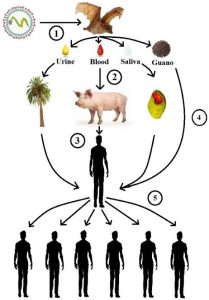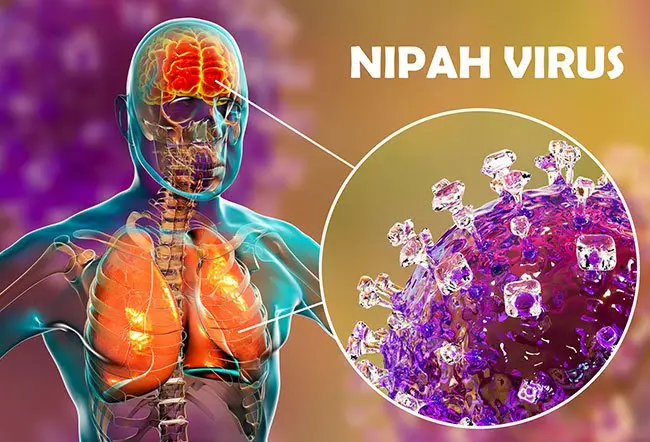
Nipah virus (NiV) is a deadly viral infection that can affect both animals and humans. It’s classified as a zoonotic virus, meaning it can be transmitted from animals to humans, and is considered a serious public health concern due to its high fatality rate and potential for outbreaks.
What Causes Nipah Virus?
NiV is caused by a virus that belongs to the Paramyxoviridae family. The natural reservoir of the virus is fruit bats, specifically the Pteropus genus. These bats can carry the virus without getting sick and can transmit it to other animals or humans through their bodily fluids.
How is Nipah Virus Transmitted?
NiV can be transmitted through:
– Direct contact with infected animals: Touching or handling infected animals, such as pigs or horses, can lead to transmission.
– Contaminated food and drinks: Consuming raw date palm sap or fruits contaminated with bat secretions can also spread the disease.
– Human-to-human transmission: Close contact with an infected person, especially in healthcare settings, can lead to transmission.
Symptoms of Nipah Virus Infection
The symptoms of NiV infection can range from mild to severe and include:
– Fever and headache: High fever, headache, and muscle pain are common symptoms.
– Respiratory problems: Cough, sore throat, and difficulty breathing can occur.
– Neurological symptoms: Encephalitis (brain inflammation), seizures, and coma can occur in severe cases.
– Gastrointestinal symptoms: Nausea, vomiting, and diarrhea can also occur.
Diagnosis and Treatment
Diagnosis is typically made through laboratory tests, such as RT-PCR or ELISA. There is currently no specific treatment for NiV infection, and supportive care is the primary approach. This includes:
– Rest and hydration: Patients are advised to rest and stay hydrated.
– Symptom management: Medications may be prescribed to manage symptoms such as fever, headache, and respiratory problems.
– Intensive care: In severe cases, patients may require intensive care, including mechanical ventilation and management of complications.
Prevention and Control
Preventing NiV infection requires a multi-faceted approach:
– Avoiding contact with infected animals: People should avoid touching or handling animals that may be infected with the virus.
– Practicing good hygiene: Regular handwashing and proper sanitation can help prevent the spread of the virus.
– Avoiding contaminated food and drinks: Raw date palm sap and fruits that may have been exposed to bat secretions should be avoided.
– Using personal protective equipment (PPE): Healthcare workers should use PPE when caring for patients with suspected or confirmed NiV infection.

